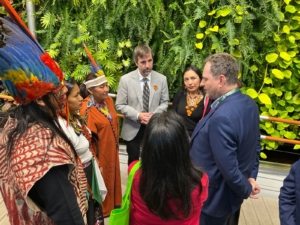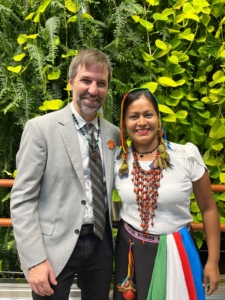Two women part of the “Indigenous Visions for Climate Justice” project attended an international meeting in Montreal, Canada. Marisol García and Maritza Paredes share some contributions about the event.
Between September 27 and October 6, 2023, the project's principal investigator and sociologist Maritza Paredes, along with ally Marisol García, president of the Federation of Kechwa Chazuta Amazonas Indigenous Peoples (FEPIKECHA), traveled to Montreal, Canada for an international meeting.
Here are their contributions:
The meetings were part of the Adaptation Futures conference and an international workshop organized by the Center for Indigenous Conservation and Alternative Development (CICADA) and the Mohawk Council of Kahnawà:ke, supported by IDRC.daptation Futures y un taller internacional organizado por el Centro para la Conservación y el Desarrollo Alternativo Indígena (CICADA) y el Consejo Mohawk de Kahnawà:ke y apoyado por IDRC.
The International Development Research Centre IDRC funds the project.
The The four-day workshop gathered over 50 Indigenous representatives, academics, non-governmental, and governmental stakeholders at McGill University in Montreal.
In that regard, there was an exchange with Canadian Indigenous peoples through visits to Kahnawà:ke communities, organized by the Mohawk Council of Kahnawà:ke and Kahnawà:ke Tourism.
The main objective was to exchange knowledge and strategies for achieving climate justice from an Indigenous perspective, as well as to delve into ethical approaches to participatory action research and strengthen relationships and alliances.
After the workshop, Paredes and García were present in the session Indigenous Peoples, Climate Justice, and Participatory Action Research in the Americas: Knowledge Exchange and Building Alliances for Living Territories..
IDRC and CICADA arranged for, in Adaptation Futures, there was a space for Indigenous Peoples to engage in dialogue about common issues.
There was an effort to facilitate in-person dialogue among them, and the conclusions drawn sought to be linked with important figures such as the United Nations Special Rapporteur on the Rights of Indigenous Peoples.
During Adaptation Futures, Indigenous leaders had the opportunity to meet with Canada's Minister of the Environment, Steven Guilbeault.
How was the project's participation?
Paredes presented the project by detailing the methodology, the empirical strategy employed, presenting the research results in San Martín, and finally, she introduced two participatory action research methods: the Indigenous Peoples' Platform for Climate Change and the Collective Mapping of Kichwa visions on the territory.

Photo of Indigenous leaders alongside Canada's Minister of the Environment.
Project objectives:
The main objective is to analyze the perspectives of Indigenous Peoples on climate justice from their territories in Chile and Peru, and their interaction with state climate policies and actions. To influence the incorporation of these perspectives into official climate policy processes.
In this line, Paredes presented the subnational cases in an Amazonian region, San Martín, and an Andean one, Arequipa. Then, the sociologist proceeded to explain the project's methodology:
At the national level, a thorough documentary analysis was conducted, in addition to semi-structured interviews with state actors, NGOs, and national indigenous organizations. Furthermore, a workshop will be held in the second half of 2024.
At the subnational level, two ethnographic case studies were conducted. In this regard, the team employed various methods, including participatory methods for information collection such as talking maps and timelines, ethnographic and semi-structured interviews, participant observation, and regional workshops for socializing and contrasting initial findings.
For this purpose, relationships were established with indigenous federations, ethical approval was obtained from a committee, and three field trips were conducted over the course of one year for each case. Additionally, an intercultural Kichwa field assistant was involved.
In addition to research activities, advocacy activities are proposed, such as co-organizing events, conferences, and seminars, radio/podcast episodes featuring indigenous leaders, dissemination documents, etc.
Later, Paredes presented the research results of Kichwa Visions for Climate Justice in San Martín.
That consisted of four points:
- Recognition: there is no adaptation without territorial security.
- Redistribution: The double-edged sword of climate funds.
- Participation is not just a bureaucratic process.
- Transformation is not only an environmental issue but also intergenerational and intercultural.
Regarding Action-Research, Paredes spoke about the Indigenous Peoples' Platform to confront Climate Change and the Collective Mapping of Kichwa visions on the territory in San Martín.
In the first case, the project's principal investigator detailed what the PPICC is about, then explained the challenges and implications for building regional platforms.
In the second case, the exposition was focused on how Kichwa visions for Climate Justice serve as a legal guarantee for communal territories, providing protection against pressures from conservation and other external factors such as:
Logging, illegal carbon trading, migration, among others. This implies the recognition and respect of indigenous identities, countering a history of discrimination and institutional obstacles that have restricted their rights.
Regarding talking maps, these become a crucial political tool by integrating local perspectives of the territory, offering a response to externally imposed visions, and facilitating the management of community projects.
This approach has been implemented in a working process with five Kichwa communities in San Martín.
Actors to combat climate injustice
Paredes refers to the journey as a space where significant opportunities were opened for indigenous leaders from various organizations and countries to discuss their perceptions of climate policies. The goal was to create dialogue around policies and forms of governance and their connection to the concept of climate justice.
At this point, it is important to emphasize that the impact of climate change occurs both through biophysical changes in ecosystems and at the level of climate policies, as sociologist Paredes asserts. For example, she mentions that communities living outside the forest are also affected, not only by intense heat but also by policies such as carbon credits, which could affect their territorial rights.
When asked about the event and his participation, García highlights the need to recognize the climate injustice experienced by indigenous peoples in order to find concrete solutions, and thus achieve climate justice. This necessarily involves recognizing indigenous peoples as decision-makers in socio-environmental matters.
The Kichwa leader adds, "It has been enriching to share with other indigenous peoples from different communities who have the same problem of territorial dispossession, carbon sales...climate injustice."
In relation to the threats he mentions, García recalls the unfortunate murder of the Kichwa leader and defender Quinto Inuma, which occurred in September 2023. The search for climate justice is not achieved within the Peruvian State, a context in which alliances with other institutions fit, comments the leader.
“We have had a somewhat positive response when we have gone abroad,” he recalls, giving as an example the multiple attacks and threats against Inuma's life. The leader was protected by the mechanism of early warning of the Ministry of Justice and Human Rights (Minjus), but “it was never made effective, that is why they murdered him,” concludes Marisol García.

Marisol García, president of FEPIKECHA, with the Minister of the Environment of Canada, Steven Guilbeault
New networks
According to Maritza Paredes, the events she attended with Marisol García facilitated the connection between various institutions, promoting collaboration and the exchange of experiences:
“The days before (the talks) served to get to know each other better, both for the indigenous organizations and for us, who are allies, the NGOs, universities and also to get to know other institutions that are doing work of this same type,” explains.
The dialogue on the relationships of peoples with their states and their strategies to address climate change made it possible to identify common challenges, as well as particularities in their respective territories.
The conferences Adaptation Futures, they are dedicated exclusively to adaptation to climate change. They bring together different actors to present their contributions on the topic, learn from the experiences of others and establish collaboration networks.
An example of this is the participation of the Special Rapporteur on the rights of indigenous peoples of the United Nations and Cakchiquel Maya of Guatemala, Francisco Cali Tzay. He connected virtually and commented on the progress of the UN in the protection of indigenous rights as the most vulnerable peoples in the face of the climate crisis.
Conclusions and final reflections
The closing of the retreat was marked by a ceremony conducted by Major Otsi'tsaken:ra, in full respect of the teachings and the importance of these rituals. His words resonate as an urgent call to transform our relationship with the Earth and its inhabitants:
«Nuestra madre está enferma, sufre y lucha. Al igual que nosotros cuando nos enfermamos, la Tierra también enfrenta dos posibilidades: o se recupera sanando sus heridas, o sucumbe a la debilidad y perece. La responsabilidad de esta enfermedad recae en los seres humanos. Debemos entender nuestra posición en este mundo ahora, o seremos desechados por ella. La Tierra tiene el poder y el tiempo para actuar…»
At another time, Major Otsi'tsaken:ra reminds us that although big governments believe they have power with weapons, laws and money, the prophecies anticipate a lesson. When the Earth changes, your arsenal will be worthless. It is crucial that those with wealth and weapons understand that their power is illusory in the face of the true force of nature. It is time to change our path on this planet.
— Major Otsi’tsaken:ra, Kahnawá:ke First Nation, Turtle Island (excerpt from closing ceremony)
It is worth mentioning that the event was co-organized by the Center for Indigenous Conservation and Development Alternatives (CICADA) and the Mohawk Council of Kahnawà:ke (MCK), with the support of the International Development Research Center (IDRC) of Canada .